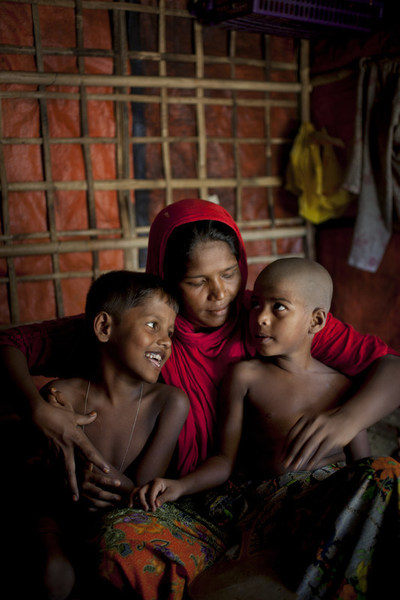Gender equality best predictor of peace, humanitarian system should listen to women: Oxfam Canada Report
OTTAWA, Oct. 16, 2018 /CNW/ - The gap between life for women in places like Canada, and life for women displaced by conflict has never been greater, says a new Oxfam Canada report published today.
Civil wars are on the rise and in 2017, they were the main driver behind most of the humanitarian crises in the world. Protected and Powerful: Putting Resources and Decision Making in the Hands of Women in Conflict pinpoints how women and girls forced to flee their homes are shut out of decisions that affect their lives.


The results are dramatic: between 25 and 50 per cent of maternal deaths in refugee settings are caused by unsafe abortions and related complications; and more than a third of Rohingya women in refugee camps say they do not feel safe collecting water or using the toilet. Both are problems that could be solved by a humanitarian system that listens to women.
"Gender inequality is exacerbated during conflict and displacement. Women and girls are less likely than men and boys to have adequate access to food, healthcare, shelter and documentation, and bear the burden of care-related tasks such as collecting water and caring for the sick and injured," said Brittany Lambert, Oxfam Canada's humanitarian policy lead and author of the report. "Aid needs to be designed acknowledging this."
Interventions that are 'one-size fits all' don't account for those differences and therefore don't work for women. Supporting women's rights in fragile or conflict-affected countries is both fundamental to delivering life-saving aid and to ensuring long term stability and peace. The report highlights how gender equality is the best predictor of a country's peacefulness – more so than its level of democracy, its level of wealth or its ethnic and religious makeup.
The report also notes progress made by the Canadian government such as the Feminist International Assistance Policy and the National Action Plan on Women, Peace and Security. Despite this, there remains a crucial gap between these commitments and current resourcing on the ground. In 2016, only 0.1 per cent of Canada's total humanitarian aid had gender equality as a main goal.
"To ensure that women in conflict are not just protected, but powerful, Canada's humanitarian aid must put decision making and resources in the hands of women fleeing war and conflict," said Julie Delahanty, Oxfam Canada's Executive Director. "Let's commit Canada to aid that listens."
With the report, Oxfam Canada is launching a campaign titled "What She Knows Matters" in support of women who are forced to flee conflict worldwide. The campaign will engage Canadians so that they have a greater understanding of the issues facing women fleeing conflict and how Canada can help.
Oxfam Canada is calling on the Canadian government to dedicate investments to gender-transformative humanitarian action that addresses the unique needs of women and works to change gender power relations. This includes:
- Dedicating 15% of Canada's international humanitarian assistance to specific gender in emergencies work.
- Fulfilling Canada's commitment to direct 25% of international humanitarian assistance to local and national organizations by 2020 and committing to having a quarter of this commitment go directly to women's rights actors.
- Ensuring that sexual and reproductive health and rights and protection from gender-based violence are treated as priority interventions in humanitarian settings.
- Publishing a feminist foreign policy.
Notes to editors:
- 'Protected and Powerful: Putting Resources and Decision Making Power in the Hands of Women in Conflict' report is available here.
- Information on Oxfam Canada's campaign What She Knows Matters is available here.
- Oxfam's 'One Year On: Time To Put Women and Girls at Heart of The Rohingya Response' report is available here.
- Oxfam Canada has produced a video visually demonstrating some of the dangers faced by women fleeing conflict. The video helps Canadians understand why aid agencies and others need to listen to others. The video can be found here.
ABOUT OXFAM CANADA
Oxfam Canada is part of a global movement for change made up of 19 Oxfam affiliate organizations working in more than 90 countries to mobilize the power of people against poverty.
SOURCE Oxfam Canada

For information and interviews contact: Paula Baker, Media Relations, Oxfam Canada, (613) 240-3047, [email protected]
Share this article